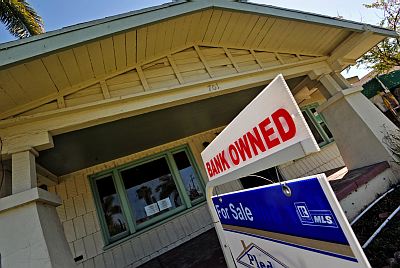The growing foreclosure debacle, involving a host of lenders caught filing dubious paperwork, has finally caught up with the stocks of major banks. This week, Bank of America’s stock sank by 5 percent, while JPMorgan Chase’s dipped 3 percent. More staggering, though, are financial analysts’ predictions on just how much the foreclosure disaster will end up costing Wall Street.
One analyst with Connecticut-based Rochdale Securities told the New York Times‘ Nelson Schwartz that “Foreclosuregate,” as it’s being dubbed, could cost banks $1.5 billion a quarter. Another analyst with FBR Capital Markets estimated $6 billion to $10 billion altogether. Offering the doomsday prediction is San Francisco-based Branch Hill Capitol, which surmised that Bank of America alone could bleed $70 billion from pools of mortgages (known as mortgage-backed securities) that it may be forced to repurchase from the largely taxpayer-owned, government housing corporations Fannie Mae and Freddie Mac. (The banks would have to repurchase the loans because they were executed in a deceptive, fraudulent manner.) “We think this is a very important issue, and the liability will be substantial,” a partner at Branch Hill told the Times. “There has been pervasive bad behavior throughout the system.”
To a degree, Wall Street’s big banks are bracing for the pain. As the Times reported, JPMorgan has set aside an additional $3 billion in reserves to cover the repurchasing of mortgage loans. Still, no bank has $70 billion in reserves, and as some rightly fear, a prolonged foreclosure crisis could cripple some of the country’s largest financial players.
This entire mess, you’ll remember, began when GMAC Mortgage, a subsidiary of Ally Financial, admitted in a leaked message that there were “defects” that were “technical” in its foreclosure filings. That was the first domino to fall. From there, it emerged that GMAC’s “technical” problem was in fact not technical at all: It stemmed from the admission by a “document execution” employee that he and his co-workers signed tens of thousands of foreclosure legal filings without reading them or knowing what they said, a violation of federal rules of civil procedure. And when it came out that plenty of mortgage companies used “robo signers” like GMAC’s, the full extent of the foreclosure debacle became clear. (For a fuller rundown of the issue, read here, here, and here.)
Now, state attorneys general and regulatory officials in all 50 states are investigating the mortgage servicing industry’s practices. One question they’ll be asking is: Where were the servicing industry’s regulators during all of this? As it happens, Mother Jones was asking that question in January of this year, in an investigative piece on this industry. As I reported in our January/February 2010 issue,
Oversight of this troubled industry is spotty. “This is a very underregulated part of the system,” says Jack Guttentag, an industry expert and professor emeritus of finance at the Wharton School. “It shouldn’t be, because it’s the part where the consumer has no place to protect themselves.” Federal law allows servicers to send borrowers only one account statement a year—even if there are scheduled interest rate increases or new fees added during that time. If a borrower has a problem, HUD encourages her to first file a complaint with the servicer, and if there’s no resolution after nearly three months, she can then appeal to the agency—assuming she hasn’t been evicted in the meantime. While HUD can step in to fix the problem, it lacks the power to impose tough sanctions on servicers.













